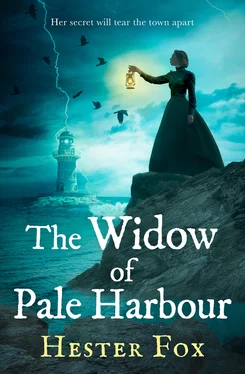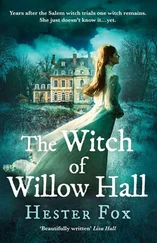But even on the hard days like this, she relished her role as owner and editor of the magazine, and wouldn’t give it up for anything. All the work could be done from her desk in the parlor, and then Garrett would take her packets of papers and notes and mail them to the office in Portland. It gave her a sense of fulfillment, like maybe her solitary life on the hill wasn’t completely fruitless and without merit.
She had worked hard to achieve success as the magazine’s owner. There were half a dozen editors and businessmen who would have been only too happy to see her stripped of her position. So what if her ownership was the result of a technicality? Nathaniel had thought that, should anything happen to him, the magazine would be safest in her name, somewhere competitors couldn’t get at it. She suppressed a grim laugh. If he’d had any idea when he would die, and in the manner he had, no less, he never would have taken the liberty.
“Duchess, you may have cost us the next Shelley or Byron,” Sophronia muttered as she tried to peel the inky pages apart in vain. Duchess gave her an unapologetic glare from the windowsill.
Crouching down, she set all the salvageable pages in front of the grate to dry, and rocked back on her heels. Her vision began to swim as she stared down at her hands, and for a moment they were not stained in black ink, but crimson blood. So much blood...beneath her nails, crusted into her cuticles, smeared across her face. Just like on that fateful night.
The smell of damp earth filled her nostrils, and she could feel the unforgiving wind biting at her cheeks, though the fire was licking away in the grate. Clean, clean... She had to wash her hands, scrub them until they were pink and innocent again before anyone saw and realized what she had done. Heart racing, she rushed to the kitchen sink, pouring scalding water out from the kettle and mercilessly scouring the offending flesh.
The waking nightmare didn’t break until her hands were raw and burned, the skin singing with pain. She jumped back from the sink, trembling with how quickly the chimera had come on. A nervous laugh threatened to erupt, but she held it in. God, what a foolish creature she could be.
A breath of fresh air would revive her and clear away the bad memories. She gave her hands one last harsh wipe on a towel, and then went and fetched her cloak and bonnet and steeled herself to face the outside world.
She pushed the door open. The first few steps outside the house were always the hardest, but if she could just get a little momentum, then by the time she was out the door she could keep going, at least a little ways.
If it wasn’t for the quiver of movement from the breeze, she would have completely missed the sliver of black marking the door. Slowly, she took a step back into the foyer, her gaze trained on the door and the alien object attached to it.
Below the elaborate brass knocker, a long, black feather hung from a nail.
With a trembling hand, Sophronia slowly reached out and touched it, half-hoping that it would be as fleeting and insubstantial as the delusion that had just gripped her in the kitchen. But the soft bristles met her fingers with heart-sinking solidity.
Sophronia’s blood ran cold as she jerked her hand back. It had been still and quiet in the house all morning. How had someone managed to hammer in the nail without her hearing anything?
It was as if whoever had left the ravens had read the doubts in her mind and wanted to make certain that she understood none of this was coincidence or an accident. This was as bold a statement as Martin Luther nailing his theses to the church door. This was a declaration, but of what?
In a fit of panic, Sophronia tried to pry the nail from the door. When it wouldn’t budge, she snatched at the feather, sending torn black filaments floating to the ground. But the quill would not budge.
“Blast it.” She would have to ask Garrett to pry out the nail and patch the hole. At least it could be easily fixed, and Garrett was nothing if not discreet.
But that was little comfort to Sophronia, who felt as if the world were pressing in around her. Felt as if eyes watched her every movement, even through the walls of the house. If she had thought that the change she had felt coming to Pale Harbor was to be positive, then it seemed she was sorely mistaken. Now it was a growing sense of dread that hung over her, as if a predator was circling just beyond her line of sight, slowly closing in on her.

With a letter in his pocket, Gabriel wandered down toward the harbor, looking for the post. It was a small town, with most of the homes and buildings rising up from the edges of the water, clinging to the salty lifeblood that provided its food and industry. His walk took him past the same run-down houses he had seen the previous week, now benevolently gilded in gentle sunlight. He had been in Pale Harbor for a week now, meeting with the townspeople, cleaning out the church and generally gathering his bearings. But it still felt wrong, and he no more felt that he belonged in Pale Harbor than he had in Concord without Anna.
Restless and a little homesick, the night before he had written to the only person in Concord he considered a friend, Tom Ellroy. Tom, who he had known since they were both boys running wild through the Massachusetts countryside, had stuck by him through thick and thin, and there had been plenty of thin, especially when they’d both joined the navy on a boyish whim. Gabriel had four older sisters, and Tom was the brother he’d never had. Tom alone was privy to Gabriel’s reasons for coming to Pale Harbor and the deception he had practiced in getting here.
The morning dawned dry and warm, a crystal-clear September day. Dirt mingled with sand, and every breath carried with it the faint promise of the great ocean beyond. Gabriel was small and inconsequential, a drop of salt water among many in the seaside town, and how liberating it was. In the light of day, the dark discovery in the church seemed far away, and his awkward dinner with the Marshalls insignificant. Maybe he would not be a success as a minister, but he had come this far, and if nothing else, it would be the fresh start he so desperately needed.
Despite the fair weather, the waterfront was quiet, subdued. Only a few small boats bobbed in the placid water, and a handful of dockworkers leisurely unloaded nets full of fish. Mr. Marshall had told Gabriel that twenty-five years ago, Pale Harbor would have been a bustling port, with all sorts of languages being spoken as ships unloaded their goods from lands as far away as China. But the war with the British in 1812 and the subsequent closing of trade routes had strangled the cosmopolitan breath from the town, leaving it choked and withered.
Gabriel ambled down to the water, watching seagulls squabble over a dropped fish. Despite his pledge to take all the rain as a penance, he was enjoying the early autumn sun on his face.
He found two young men taking a rest from unloading crates on the dock, their shirts stuck to their backs with perspiration, their sleeves rolled to the elbows. When he asked them where he could post a letter, they directed him to the dry goods store on the other side of town.
He thanked them and was about to turn to leave. He knew he should introduce himself, tell them about the new church. That’s what a minister was supposed to do. But the idea of proselytizing made him shrink into his skin, and despite days of practicing in front of the mirror, he still tripped over his words and came across as a fool. They would probably scoff at him, just as the Marshalls surely had as soon as Gabriel had left their home, and he couldn’t bear to hear Anna’s dearest beliefs disparaged.
Читать дальше












![Helen Rowland - The Widow [To Say Nothing of the Man]](/books/752764/helen-rowland-the-widow-to-say-nothing-of-the-man-thumb.webp)
